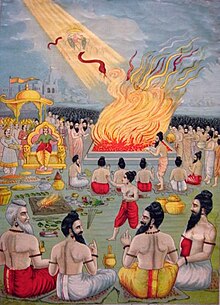| Astika | |
|---|---|
 The snake sacrifice of Janamejaya, as Astika (boy in red) stops the king The snake sacrifice of Janamejaya, as Astika (boy in red) stops the king | |
| Information | |
| Family | Jaratkaru (father) Manasa (mother) |
Astika (Sanskrit: आस्तिक, romanized: Āstīka) is a rishi (sage) featured in Hinduism. He is the son of Jaratkaru by the serpent goddess, Manasa.
Legend
Birth
According to the Devi Bhagavata Purana, a sage named Jaratkaru was wandering a forest when he came across his Pitrs (spirits of his forefathers), hanging over a precipice of blades of grass. His forefathers explained to him that they suffered due to the fact that Jaratkaru had no children, and was the last of his line. In a bid to save his Pitrs from their ordeal, Jaratkaru decided to marry a woman who shared his name. He visited the naga king Vasuki, and married his sister, Manasa, one of whose names was Jaratkaru. At the site of Pushkara, one evening, Jaratkaru slept upon the lap of his wife, and had not performed his prayers at dusk. Facing the dilemma of having to disturb the sleep of her husband so that he may perform his duty, she chose to rouse him. Furious, Jaratkaru decided to leave his wife for this act. When Manasa begged for his forgiveness, Jaratkaru informed her that she was pregnant with his child, and proclaimed that he would be brilliant and devoted. Thus, he was named Astika. Astika completed his education under Sage Chyavana, the son of Bhrigu. According to the Devi Bhagavata Purana, since his mother was a disciple of Shiva, Astika also became a disciple of the deity.
Snake sacrifice
According to the Mahabharata, Astika saved the life of the serpent Takshaka. This occurred when the king Janamejaya organised a snake sacrifice known as the Sarpa Satra, where he made great sacrifices of serpents, to avenge for the death of his father Parikshit, due to snakebite of Takshaka. Ultimately, he induced and prevailed upon the king to end his persecution of the serpent race. His father left him before his birth. In popular tradition, the day these serpents were saved is regarded to be the Shukla Paksha Panchami in the month of Shravana, and is celebrated as the festival of Naga Panchami.
References
- www.wisdomlib.org (15 June 2012). "Astika, Āstika, Āstīka, Astikā, Ashtika: 21 definitions". www.wisdomlib.org. Retrieved 19 November 2022.
- www.wisdomlib.org (28 January 2019). "Story of Āstīka". www.wisdomlib.org. Retrieved 19 November 2022.
- Son of Abhimanyu, who in turn was a son of Arjuna.
- Gopal, Madan (1990). K.S. Gautam (ed.). India through the ages. Publication Division, Ministry of Information and Broadcasting, Government of India. p. 72.
- Garg 1992, p. 743.
Bibliography
- Garg, Gaṅgā Rām (1992). Encyclopaedia of the Hindu World. Concept Publishing Company. ISBN 978-81-7022-376-4.
- Dictionary of Hindu Lore and Legend (ISBN 0-500-51088-1) by Anna L. Dallapiccola
| Rishis | |||||||||||||||
|---|---|---|---|---|---|---|---|---|---|---|---|---|---|---|---|
| Saptarshi |
| ||||||||||||||
| Other |
| ||||||||||||||
| Hindu deities and texts | ||
|---|---|---|
| Gods |  | |
| Goddesses | ||
| Other deities | ||
| Texts (list) | ||